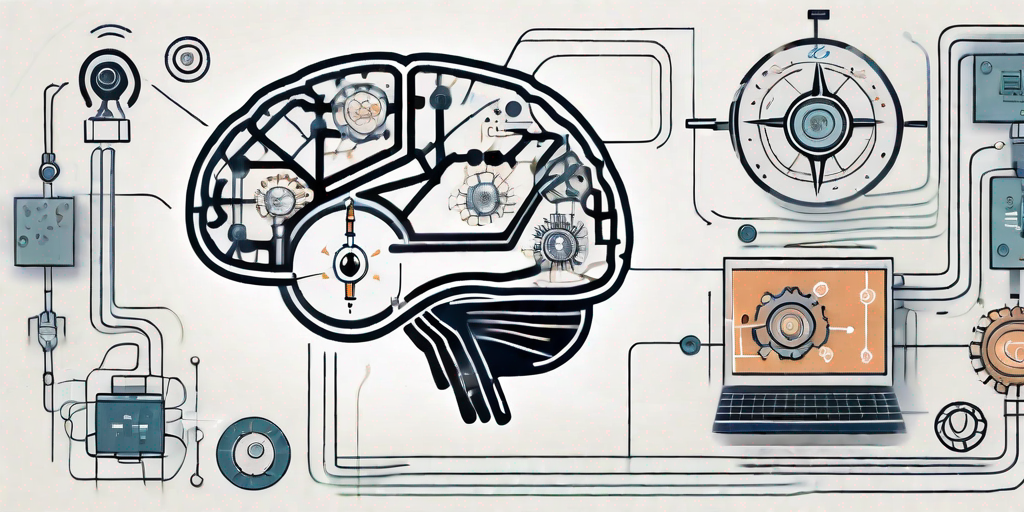Strategy Speaker: Guiding Your Understanding of Artificial Intelligence

Strategy Speaker: Guiding Your Understanding of Artificial Intelligence
In today's rapidly evolving technological landscape, one concept that continues to captivate the imagination and reshape industries is Artificial Intelligence (AI). As AI becomes increasingly prevalent, it is crucial for individuals and organizations alike to grasp the fundamental principles and practical applications of this groundbreaking technology. This article sets out to elucidate the multifaceted world of AI, guided by the expertise of a Strategy Speaker who specializes in navigating the complexities of this field.
Understanding the Principles of Artificial Intelligence
To fully appreciate the potential of AI, it is essential to delve into its underlying principles. At its core, AI is the development of computer systems capable of performing tasks that would typically require human intelligence. These systems are designed to learn, reason, and make decisions based on vast amounts of data. By harnessing machine learning algorithms, AI can process information with remarkable speed, uncover hidden patterns, and generate valuable insights.
One key aspect of AI is its ability to adapt and improve over time. Through the iterative process of training algorithms on large datasets, AI models become increasingly accurate in their predictions and recommendations. This adaptive capacity empowers organizations to optimize their operations, enhance customer experiences, and drive innovation.
Let's take a closer look at the concept of machine learning, which lies at the heart of AI. Machine learning is a subset of AI that focuses on enabling computers to learn from data without being explicitly programmed. It involves the development of algorithms that can automatically analyze and interpret patterns in data, allowing the computer to make predictions or take actions based on this analysis.
There are different types of machine learning algorithms, each with its own strengths and applications. One common type is supervised learning, where the algorithm is trained on labeled data, meaning data that is already categorized or classified. The algorithm learns from this labeled data and can then make predictions or classify new, unseen data.
Another type of machine learning is unsupervised learning, which involves training the algorithm on unlabeled data. In this case, the algorithm must find patterns or structures in the data on its own, without any predefined categories. Unsupervised learning is often used for tasks such as clustering or anomaly detection.
Reinforcement learning is yet another type of machine learning, where an algorithm learns through trial and error. It interacts with an environment and receives feedback in the form of rewards or punishments based on its actions. Over time, the algorithm learns to take actions that maximize the rewards and minimize the punishments, leading to optimal decision-making.
AI also encompasses natural language processing (NLP), which focuses on enabling computers to understand and interpret human language. NLP involves tasks such as speech recognition, sentiment analysis, and language translation. Through NLP, AI systems can interact with users in a more natural and intuitive way, opening up possibilities for virtual assistants, chatbots, and voice-controlled devices.
As AI continues to advance, ethical considerations become increasingly important. Questions arise regarding the potential impact of AI on privacy, security, and employment. It is crucial to develop AI systems that are transparent, accountable, and respectful of human values. This involves addressing biases in data, ensuring fairness in decision-making, and establishing regulations and guidelines to govern the use of AI.
In conclusion, understanding the principles of AI is essential for grasping its potential and implications. AI enables computers to perform tasks that would typically require human intelligence, through the use of machine learning algorithms. These algorithms allow computers to learn from data, adapt over time, and make predictions or take actions based on their analysis. As AI continues to evolve, it is crucial to consider ethical considerations and ensure that AI systems are developed and used responsibly.
How a Strategy Speaker Simplifies AI Concepts
As revolutionary as AI may be, grasping its intricacies can be challenging. This is where a Strategy Speaker excels. With a specialized skill set, they possess the unique ability to translate complex AI concepts into digestible nuggets of knowledge. Their approachable and engaging delivery ensures that audiences can immerse themselves in the subject matter without feeling overwhelmed by technical jargon.
Imagine sitting in a packed conference room, eagerly awaiting the start of a presentation on artificial intelligence. The room is abuzz with anticipation, as attendees from various industries hope to gain insights into this rapidly evolving field. Suddenly, the Strategy Speaker takes the stage, radiating confidence and expertise.
With a charismatic presence, the Strategy Speaker begins by sharing relatable metaphors that instantly connect with the audience. They compare the workings of AI algorithms to the intricate gears of a clock, each component working seamlessly to produce remarkable results. This analogy sparks a sense of curiosity and wonder, as attendees visualize the inner workings of AI systems in a tangible and relatable way.
Real-world examples further enhance the understanding of AI concepts. The Strategy Speaker delves into how AI is transforming industries such as healthcare, finance, and transportation. They illustrate how natural language processing algorithms are revolutionizing customer service, enabling chatbots to understand and respond to human queries with remarkable accuracy. The audience is captivated by stories of AI-powered virtual assistants that can schedule appointments, order groceries, and even engage in meaningful conversations.
But it's not just about the technology itself; it's about the potential it holds. The Strategy Speaker paints a vivid picture of a future where autonomous vehicles navigate our cities, reducing traffic congestion and minimizing accidents. They describe how AI algorithms analyze vast amounts of data in real-time, making split-second decisions to ensure passenger safety. The audience is transported into a world where self-driving cars seamlessly coexist with pedestrians, cyclists, and traditional vehicles, all thanks to the power of AI.
Throughout the presentation, the Strategy Speaker's aim is to enlighten and inspire. They encourage individuals to embrace AI as a tool for innovation and growth, regardless of their industry or background. By breaking down complex concepts into relatable narratives, the Strategy Speaker empowers the audience to unlock the value of AI within their own domains.
As the presentation draws to a close, the room is filled with a renewed sense of excitement and possibility. Attendees leave with a deeper understanding of AI and the confidence to explore its potential in their respective fields. Thanks to the Strategy Speaker's ability to simplify and engage, the world of AI becomes more accessible, paving the way for a future where AI is not just a buzzword, but a transformative force.
The Role of AI in Business and Industry
In an increasingly data-driven world, the adoption of AI is revolutionizing various facets of business and industry. From automating repetitive tasks to optimizing supply chain management, AI has the potential to enhance operational efficiency and drive significant cost savings. Additionally, AI-powered chatbots and virtual assistants are transforming customer interactions, delivering personalized experiences, and improving overall satisfaction.
Moreover, AI is revolutionizing industries such as healthcare, finance, and manufacturing. In healthcare, AI is aiding in the diagnosis of diseases, analyzing medical images, and predicting patient outcomes. AI algorithms are trained on vast amounts of medical data, enabling them to identify patterns and make accurate predictions. This technology has the potential to greatly improve patient care and outcomes.
In finance, AI is revolutionizing fraud detection, personalized wealth management, and algorithmic trading. AI algorithms can analyze large volumes of financial data in real-time, detecting patterns and anomalies that humans may miss. This enables financial institutions to detect and prevent fraudulent activities, provide personalized investment advice, and make data-driven trading decisions.
Furthermore, AI is transforming the manufacturing industry by optimizing production processes, enabling predictive maintenance, and improving product quality. AI-powered systems can analyze data from sensors and machines in real-time, identifying potential issues before they occur. This allows manufacturers to schedule maintenance proactively, reducing downtime and improving overall efficiency. Additionally, AI can analyze production data to identify areas for improvement, leading to higher quality products and increased customer satisfaction.
It is important to note that the adoption of AI in business and industry is not without challenges. One of the main challenges is the ethical implications of AI, particularly in areas such as privacy and bias. As AI systems rely on large amounts of data, there is a risk of privacy breaches if this data is not handled securely. Additionally, AI algorithms can be biased if they are trained on biased data, leading to unfair outcomes. It is crucial for organizations to address these ethical concerns and ensure that AI is used responsibly.
In conclusion, AI is playing a transformative role in business and industry. From automating tasks to improving customer interactions, AI has the potential to revolutionize various sectors. However, it is important for organizations to carefully consider the ethical implications and ensure that AI is used responsibly to maximize its benefits.
Strategy Speaker's Approach to Practical AI Applications
The role of a Strategy Speaker extends beyond demystifying AI concepts. They also excel at showcasing the practical applications of AI across various industries. By analyzing real-life case studies, they reveal how organizations have successfully leveraged AI to gain a competitive edge and achieve strategic objectives. This approach enables individuals and businesses to identify opportunities for AI implementation within their specific contexts.
Whether it's utilizing AI-powered recommendation systems to personalize marketing campaigns or harnessing computer vision algorithms to automate quality control processes, a Strategy Speaker empowers audiences with the knowledge and inspiration to envision and pursue innovative AI solutions that drive tangible results.
Leveraging AI for Strategic Decision Making
One of the most compelling aspects of AI is its potential to inform strategic decision making. By analyzing vast datasets and uncovering patterns, AI systems can generate actionable insights that support informed decision-making processes. From predicting customer behavior to identifying market trends, AI equips decision-makers with invaluable intelligence, enabling them to anticipate challenges, seize opportunities, and steer their organizations in the right direction.
However, it is important to recognize that the human element remains essential in the decision-making process. AI serves as a powerful tool, augmenting human capabilities rather than replacing them. With a Strategy Speaker's guidance, individuals can learn how to strike the optimal balance between AI-driven insights and human intuition, harnessing the power of AI to make informed, holistic decisions.
Conclusion
In the rapidly evolving landscape of AI, a Strategy Speaker serves as an indispensable guide, leading individuals and organizations through the complex terrain of this transformative technology. Through their expertise, they simplify intricate AI concepts, illuminate practical applications, and empower decision-makers to navigate this ever-changing landscape with confidence. By harnessing the insights and inspiration provided by a Strategy Speaker, you can embark on a transformative journey, unraveling the immense potential of AI and making informed decisions that shape the future of your industry.
FAQ
What is Artificial Intelligence (AI)?
Artificial Intelligence (AI) refers to the development of computer systems that can perform tasks that typically require human intelligence. It involves the use of machine learning algorithms to process data, learn from it, and make decisions or predictions based on the analysis.
What are the different types of machine learning algorithms used in AI?
There are three main types of machine learning algorithms used in AI: supervised learning, unsupervised learning, and reinforcement learning. Supervised learning involves training the algorithm on labeled data, unsupervised learning involves training on unlabeled data to find patterns, and reinforcement learning involves learning through trial and error with feedback from the environment.
How is AI being applied in business and industry?
AI is being applied in various ways in business and industry. It is being used to automate repetitive tasks, optimize supply chain management, improve customer interactions through chatbots and virtual assistants, aid in healthcare diagnosis and prediction, enhance fraud detection in finance, and optimize production processes in manufacturing.
Contact a Strategy Speaker for Your Event
Are you ready to take your event to the next level? Hiring Dr Mark van Rijmenam, a renowned Strategy Speaker, could be your key to unlocking the transformative potential of Artificial Intelligence. With his expertise, Dr van Rijmenam can turn complex AI concepts into digestible insights, providing your audience with a comprehensive understanding of this groundbreaking technology. Whether you're in healthcare, finance, or manufacturing, Dr van Rijmenam's unique ability to illuminate practical AI applications across various industries will inspire your attendees to envision innovative solutions within their specific contexts. Don't miss this opportunity to empower your audience with the knowledge and inspiration to navigate the rapidly evolving landscape of AI with confidence. Simply complete the form below and we will be in touch within 24 hours to discuss how Dr Mark van Rijmenam can transform your event into an enlightening and engaging experience.





